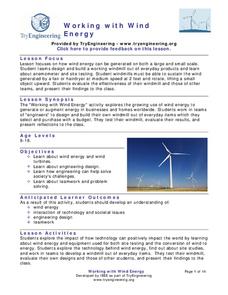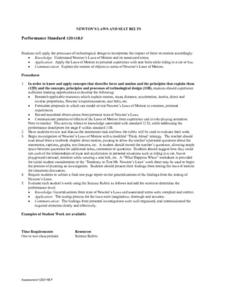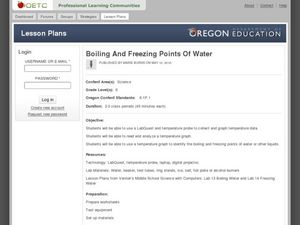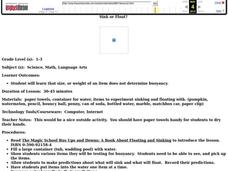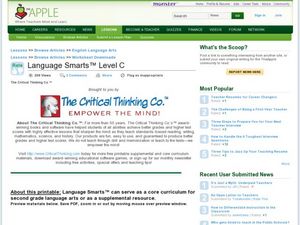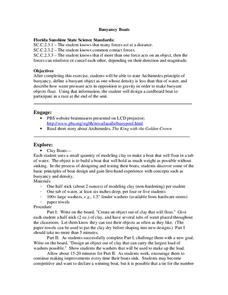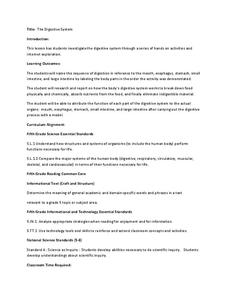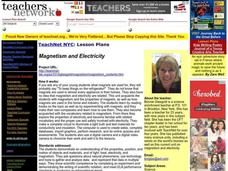Institute of Electrical and Electronics Engineers
Working with Wind Energy
After reading about how wind turbines work to collect clean energy, groups brainstorm and design their own windmill. Within the provided financial and physical constraints, groups must build a working windmill using only the materials...
English Enhanced Scope and Sequence
Differentiate between Formal and Informal Language
The Pledge of Allegiance, the Gettysburg Address, the National Anthem, and the Preamble to the Constitution all get close attention in an exercise that asks learners to rewrite these formally-worded documents into informal language....
Curated OER
Newton's Laws and Seat Belts
Students study Newton's Laws of Motion. They review an assessment task and rubric and discuss Newton's Laws of Motion. They discuss how to test the relationships of mass and acceleration in personal situations. They write a one-page...
Curated OER
Science and Values: Using Science to Shape Our Future
Students explore and discuss the link between values and science. They read several articles on such topics as global warming, cloning, genetically modified crops and animal testing and then identify the subjective aspect of science in...
Curated OER
Sink or Float?
Students examine how weight and balance can effect if an item sinks or floats. They listen to the book "Who Sank the Boat?" by Pamela Allen, and discuss how the smallest animal sank the boat. Students then conduct an experiment in...
Curated OER
Carbon Dioxide - Sources and Sinks
Where does all of the carbon dioxide come from that is supposedly leading to climate change? Earth science pupils test animal, plant, and fossil fuels as sources in this investigation. Using an indicator, BTB, they are able to detect the...
Growing Minds
Growing Minds: Cabbage Exploration
It's all about cabbage in this scientific observation resource! After reading a related story, learners explore three varieties of cabbage. They observe the leaves using a leaf diagram, predicting what the middle might look like. They...
Curated OER
Ecological Cycles Part 1
Knowing about the hydrologic cycle is the first step to understanding the carbon cycle. Upper graders discuss the earth's water content, polar ice caps, and the concept of the ecological cycle as it applies to carbon, nitrogen, and other...
Curated OER
Boiling and Freezing Points of Water
Challenge your sixth graders with this lesson about the freezing and boiling points of water. In these activities learners graph temperature data, read and analyze information, and identify the freezing and boiling points of water and...
Curated OER
Vocabulary Comic Strips
Who says comic strips aren’t educational? Prove these naysayers wrong by asking your class members to create a comic strip for a selected vocabulary word. Using online technological tools that provide access to an array of options for...
Curated OER
Eggs, Egg Test, Day 6
Students review their knowledge of eggs, their structure and nutritional value. After the test, they complete an egg lab and turn in their samples to the teacher. To end the lesson, they determine their egg score and discuss how many...
Curated OER
How Do We Generate a Large Amount of a Specific DNA Sample?
Students investigate the Polymerase Chain Reaction technique that is used to create larger amounts of a gene. They watch and discuss a PowerPoint presentation, explore a website, and write a report listing the materials needed to...
Curated OER
DNA Fingerprinting
Students discuss methods used by forensic scientists and the basics of DNA and how it can be used to identify an individual after reading an article from The New York Times.
Curated OER
Sink or Float?
Students predict and test different items to see if they sink or float. In this sink and float lesson plan, students predict whether an item is buoyant or not, and learn that size and weight do not matter when it comes to buoyancy.
Curated OER
Water in Africa
Students discover the horrible situation of water shortages that many people face by completing Peace Corps activities. In this global health lesson, students analyze and discuss photographs of people in Africa struggling to find water....
Curated OER
Writing: Revision
Looking for a worksheet on editing and revising punctuation? In this writing skills worksheet, young writers read a writing sample and identify the punctuation, spelling, and grammatical errors in the selection.
Curated OER
Problem Solving with Multi-Step Number Stories
Pupils solve multi-step number stories. They create number models to solve number stories. Everyone chooses the appropriate operation to use after reading the problem, and then work in small groups to solve.
Curated OER
Reading to Calculate
Young scholars follow directions utilizing the Casio calculator to accurately solve calculations involving fractions in preparation for the math portion of the GED test. They stress the ability of reading instructions precisely and...
Teach Engineering
Forms of Linear Equations
Linear equations are all about form. The fifth part in a unit of nine works with the different equivalent forms of linear equations. Class members become familiar with each form by identifying key aspects, graphing, and converting from...
Science 4 Inquiry
An Investigative Look at Florida's Sinkholes
In May of 1981, the Winter Park Sinkhole in Florida first appeared and is now referred to as Lake Rose. Scholars learn about the causes of sinkholes through an inquiry project. Then, they analyze recent data and draw conclusions to...
Center for Precollegiate Education and Training
Buoyancy Boats
What did the sea say to the boat? Nothing, it just waved. An inquiry-based lesson starts with a simple concept on the Archimedes Principle and challenges pupils to make something out of clay that floats. Then, they design an object out...
Curated OER
The Digestive System
Discover how the human body's digestive system works with a brain and stomach friendly activity. Scholars taste test a variety of foods to find out how they behave once in the mouth. Class members then play a game called Move That...
Curated OER
Magnetism and Electricity
Students demonstrate a comprehension of the properties, position, and motion of objects and materials, and of light, heat, electricity, and magnetism. They use materials to assemble an electric circuit and test materials, including...
Curated OER
Some People Just Don't Get It
In this daily mind builders worksheet, students use inferential reasoning and deduction. Students read a short passage and respond to 6 short answer questions stating their own opinion and providing evidence to support their conclusion.


